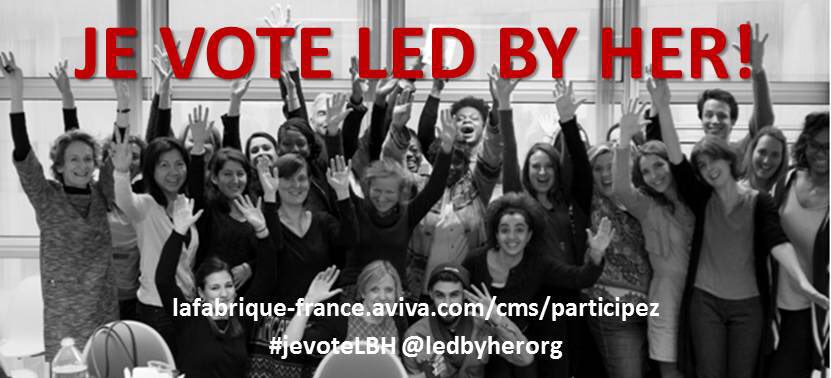This post is also available in:
![]() Français (French)
Français (French) ![]() Русский (Russian)
Русский (Russian)
By Olga FROMENTIN
Chiara Condi is founder and president of Led by HER association, created in 2014 in Paris. The purpose of this organization is to help women who have suffered from violence rebuild their lives through entrepreneurship. Led by HER is currently a unique program in this area in France.
Chiara is a young, dynamic Italian, who grew up in an Italian-American family. This alumnus of Harvard, Sciences Po, and LSE is an everyday changemaker in the field of female business and entrepreneurship. Chiara tells us why helping vulnerable women is an important mission in her life, how she started, and why it is important to better understand yourself and use your strengths and talents to move forward.
Hi Chiara, thank you for coming! First of all, congratulations to Led by Her for making to the final stage of Fabrique Aviva contest, that’s a great achievement! Can you please tell us about the project and its story?
Yes, sure! We help women who have suffered from violence to become entrepreneurs, by helping them rebuild their life around the entrepreneurship. Every year we give 30 women the opportunity to pursue an entrepreneurship program from September to July. We created the academic program of 300 hours (100 courses) with the help of 2 business schools, IESEG School of Management and ESCP Europe.
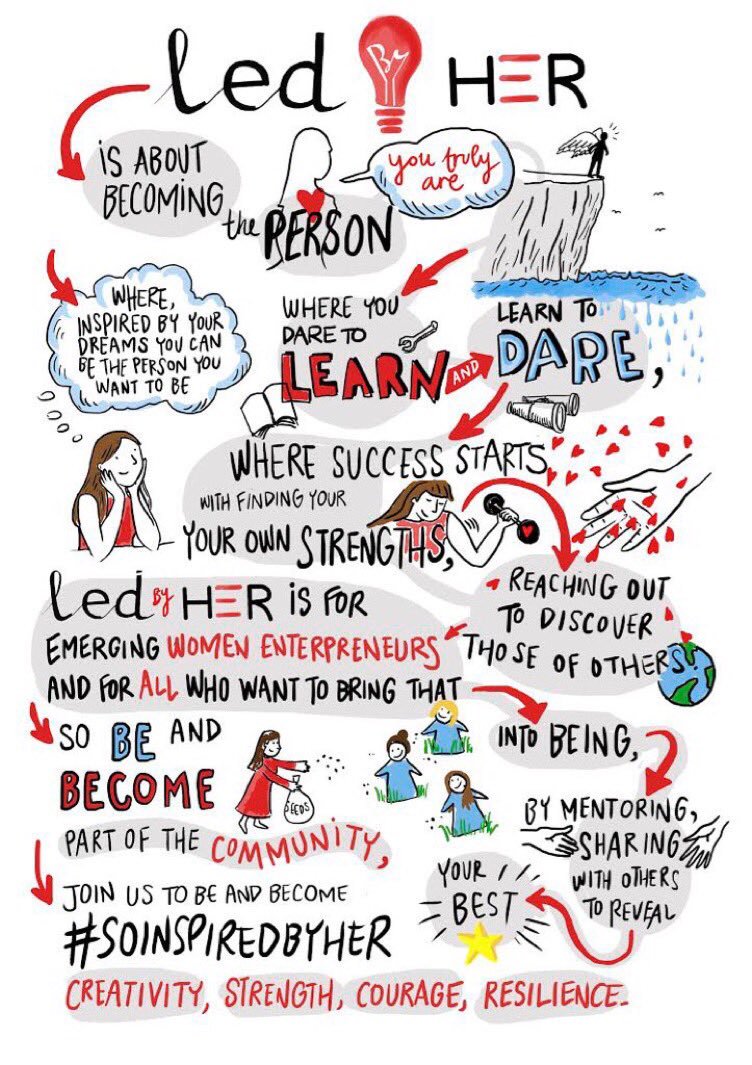
It includes entrepreneurship, technical skills, and personal development. One-third of the program consists of personal development to help participants better understand who they are, why they are there, their ambition, and the intention behind what they are creating. Their projects start from there.
We have a very diverse group of women in each cohort, representing many different nationalities and ranging in age from 23 to 60, the average age is between 37 and 50. They all start together in September. Alongside the courses, each woman is mentored individually by an experienced professor and sometimes by a coach. The mentors are trained by the organization and by the coaching school Le Playground.
We have also done large events such as hackathons to connect our participants to people and teams.
Is this the first year of the program?
This will be the 4th year in September! In addition to the program, we added different events every year, for example, our Hackathon held at Orange in March, for which 400 people signed up.
Participants worked in groups over 2 days to help each woman advance on her projects. The teams also consisted of future developers from Simplon and Epitech, as well as representatives of various companies. After two days of workshops and collective intelligence the end, participants presented their results to the jury to receive a prize to help the project develop further. The event ended with a cocktail and a concert.
We also organized a shorter version, a speed-networking event with Google. Everybody was invited to come and offer advice to concretely help women after listening to an interesting panel on advancing women.
This year, we organized an event on innovation and women’s rights with another organization, Droits D’Urgence and Laurence Rossignol, former Minister for Women’s Rights. We invited our entrepreneurial community and participants to give feedback on a platform that provided a new solution for women who have suffered from violence to better seize their rights.
Led By HER is very engaged in supporting women’s rights and innovation entrepreneurship and sharing our work with organizations such as the European Commission – Commissioner Vera Jourova visited us on November 25th to launch her action plan for Violence against women in Europe. We are also a partner of the OECD forum and will be sharing our work for a more positive world.
Do you follow-up with women who graduated from your program?
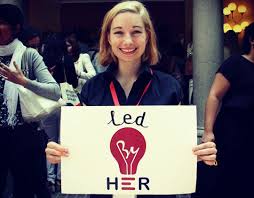
Yes, a lot of them are still part of the community, they come back to share their stories and participate in our events. The first year, the participants attend a full load of courses, but once this is over they can come back any time they want and they can choose to have a mentor for up to 3-years. They can also go back to anything they have learned through our e-learning platform which contains all our filmed courses.
It’s very interesting. How did you get the idea of this concept?
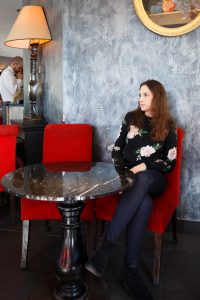
I was always very engaged in my community. When I went to Harvard, I studied history and literature, but also volunteered for a homeless shelter. It gave me an idea that I wanted to work for an international organization, work on macroeconomic problems, such as poverty etc.
I received my Masters from Sciences Po, then I went to the London School of Economics, and I started an internship at the European Bank for Reconstruction and Development. Shortly after I started, the Bank created a Gender department to increase the impact of its investments on women across all sectors.
I learned a lot and had the chance to work in many different sectors. It was a great experience. It convinced me that projects were not gender neutral and that reality affected men and women differently. I understood that, if we did not work on creating proactive measures to help women access opportunities, the world would never change. That’s how I became convinced that this was the cause I wanted to work on. At the same time, I did not enjoy working in a large institution, and wanted to create something smaller but at a micro level more impactful on real lives and to be able to see that difference.
Did you feel disillusioned at work?
I loved what I was doing and the Bank’s mission but wanted to do something on a much smaller but more human level. In a large organization, you are working on large projects with the potential to make a big difference but you are often very detached from the ground. I wanted to do something that fulfilled me more and to be able to witness the lives I had changed.
When I came to Paris, I looked at different organizations. I found that there were many associations that helped women recover from violence, yet nobody was helping them rebuild their lives. It is important to help women psychologically, give them shelter, medical assistance, link them with social workers, and everything that can remove them from their situation, but it is also important to help them build a future.
Was that why you decided to create Led By Her here, in France?
After my experience in London, I wanted to come back to France and I slowly decided to stay longer and longer and then started to build a life here. When I began to bu one thing came to another and I contacted the business schools, here in Paris and they said “yes” right away. Everything happened very quickly, I had to find women and put everything together. The first year was much simpler, we did not have many activities, just a basic academic program.
In one of your interviews you said: “Once you’ve reached a certain level, 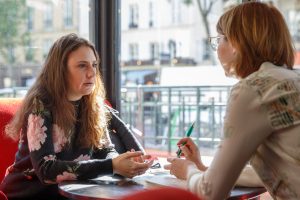 you need to sit down and think about the strategy.” Did you need to rethink the concept and go deeply into the details after your first year? Did, actually, the concept change?
you need to sit down and think about the strategy.” Did you need to rethink the concept and go deeply into the details after your first year? Did, actually, the concept change?
We have changed a lot of things! Before we didn’t have events and any partnerships with companies, we were not working with international organizations, well, at the beginning we just had the academic program.
Then once the first group of women passed through the program, we better understood what they needed and what kind of candidates would succeed, so we also adapted our “recruitment”. And we started doing more activities and trying to raise more funds for those activities.
How many are you now?
We are about twenty people engaged in the running of the organization 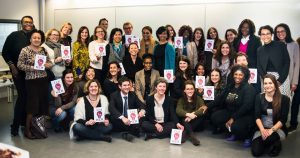 and we have 2 academic directors on board, one from IESEG, another from ESCP.
and we have 2 academic directors on board, one from IESEG, another from ESCP.
What did you do after you left the EBRD?
Well, I took a break from everything in my life, I had some health issues, and I really needed to focus on something else. I was very much looking for something that was truly purposeful. Since I had always been very engaged in my community I needed this contact with people and the feeling of being useful.
Let’s talk about success. Do you feel that you are successful or are you still on your way there?
That’s a tough question.
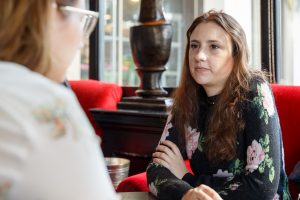
I do not feel that I have achieved everything I want to achieve yet. I do not have any regrets for what I did and I know that I did it well, at least I put all my energy and motivation into it. I guess I can feel sort of success because I gave all that I had.
But I have a lot more that I want to achieve. Although I’m satisfied with what I have already done and I still have new challengesI want to take on.
Do you think it’s easier to achieve success for a man or a woman in our society today? Does success have a gender?
I think there are different types of success and it depends on what you want in life and whether your own ambitions are fulfilled.
It can be really difficult to define success because does it mean for example that if you are not known, you can’t be successful? Or vice versa? There are so many different types of success.
What is easier for men is that they less block themselves with the limits to achieve it, they think that whatever they want is achievable and they just go and do it. Women often need to question everybody around them and believe in themselves before they take the first steps.
Do women lack confidence in general or does it depend on a person, what do you think?
I think women have a big lack of confidence, also due to the fact that we have fewer female role models (at least put in the spotlight) than men so we have fewer examples of what we could be.
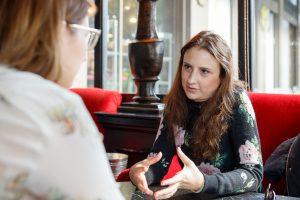
It’s funny, I was at a conference where one of the speakers was a young, self-made billionaire woman, and she said that when she helped a lot of women entrepreneurs, she realized that they had a huge problem being comfortable with making a lot of money!
I think women need a lot more confirmation from people around them before they start trying, to move forward, and to see the value in their work.
Men just know they can do it, and they go for it with much less questioning. I don’t think this is innate but rather cultural.
And who are your role models?
I don’t have any particular role models. I would say, I’m more inspired by different things people do that I would like to be able to do and achieve in my own life. I find so many people who inspire me in so many different ways by showing me what is possible.
Let’s get back to the success definition we were discussing earlier. Is money a measure of success? Is success a synonym of popularity?
I think that success has become a synonym of popularity because we have social networks that give a lot of visibility.
Obviously, money is a means to do things, it allows you to create more value in the world. And if you can’t generate more revenue or bring in money at a certain point you will find yourself stuck if you need it to evolve your business to the next step.
Is money the way to achieve success or is it the goal?
I think it’s clearly a powerful way to achieve success because money gives you the freedom to do what you want to do. It is also the means to impact the world the way you want.
This is something that they never teach us at school, how to think about money. There should be more awareness at a younger age.
You once said that “Equality is the quest” (Fr: L’égalité est une quete). Does it mean that we are in a permanent search for equality?
I think equality is achievable, but we have not reached it yet. There is a lot of inequality, but we need to solve society’s problems instead of saying it’s too late.
There is a lot of work to be done in terms of understanding where this inequality comes from. I also think there is a lot of awareness-raising work that should be done starting at a younger age. But since we have not figured out how to deal with that, we just creating ad-hoc measures and hoping that things will change.
Real solutions need to offer high levels of access and support to women, such as targeted programs that work in reality. It can be quite controversial to suggest positive discrimination. But if you don’t do that, equality will not magically appear.
What books inspired you? Blogs or articles?
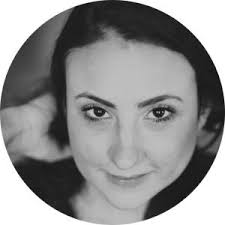
I don’t really follow any blogs, but I read plenty of articles. I love reading novels and travel literature. I love being taken to other worlds and being transported through reading. For self-development and self-improvement, I also read a lot of personal development and philosophy books.
Can you name a few writers in this area?
Yes, Pema Chondron and other Buddhist philosophers who write about looking inside oneself. We do a lot of coaching and personal development so I think it is interesting to have the science and the thinking behind that, and then to observe what works and what does not and, of course, bring clarity to myself.
Thank you, Chiara. Tell me about your daily schedule. How do you organize your day? What time do you wake up?
I used to start working as soon as I got up at 6 am and I found that it was not a good idea. Now I try to give myself time in the morning. I take my time to get ready, incorporate meditation and get some exercise.
I believe that having the right start to one’s day is one of the most important things. Because if you feel good, then everything that you do on that day will be so much better.
I have breakfast and then I go straight out for a walk. And then I give myself time to settle in and do some work. I would love to get back to yoga, I used to do it and I think it’s important. I also like to travel and to change the environment, otherwise, I feel like my mind stops being stimulated. I need changes from time to time in order to challenge my creativity.
Do you have a dedicated place to work?
Not really. I do travel around a lot, I like having this freedom to be able to work from anywhere.
I recently realized that I was spending 80% of my time in external meetings, which was not efficient. Sometimes meetings are really important, but other things can wait.
Now I schedule entire days without meetings to have time to think and focus on things that matter. It helps me to finish things fully rather than finishing pieces here and there, which is essential.
What are your hobbies, if you have any?
I have never really found the time to pursue hobbies, but when I’m motivated, I like to write.
What’s your best habit and the least favorite habit?
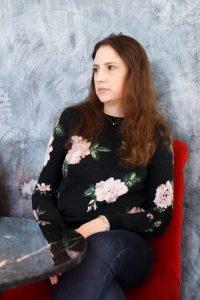
That’s very difficult to say. I force myself to have a lot of good habits… but it was not always that way. Now I’m starting to enjoy walking every day and meditating. For me, it all starts from oneself:
by taking care of yourself you discover that the more energy you have, the more you will be able to invest in your projects.
You are such an active person. Do you happen to procrastinate?
Well, yes!
How do you fight procrastination?
I think that the hardest thing is to start, but if I manage to start, I finish something, I don’t stop in the middle. I try to give myself a lot of time to actually finish things at once and get through them fully.
Sometimes I don’t have enough time. In this case, I choose the most important thing every day and make sure I do it first, even if it’s not the most interesting thing for me; I prioritize.
If you start too many things and you don’t finish any of them, you start procrastinating.
What do you use to organize your day?
Google calendar!
It works the best for me because it sends me a reminder to my phone 30 min before something starts. If I forget something, I remember!
And for meditation?
I really like “The Honest Guys”, they have plenty of videos on YouTube, the meditations are guided, so you hear sounds, like walking through the wood and envisioning them is very relaxing.
Can you please give our readers a piece of advice – what should women do to achieve success?
I think the priority is to understand what you enjoy doing and what you do best, what are your talents. Once you do this you will achieve better results in your area and by putting in 20% effort you will get 80% results.
You need to stop doing something that you don’t want to do if you are not happy.
If instead of using your strengths, you are correcting your mistakes your work will be average, but if you concentrate on amplifying your strengths you will become excellent!
Great point! Chiara, what’s next for you?
That’s a very good question. There are many more things I would like to do to create more women entrepreneurs on a more global level. I’m somebody who will always have new projects, that’s just my nature. I have a lot more that I want to achieve. And I definitely like to write more!
So maybe a new book coming soon?
Yes, why not.
Great, we’re looking forward to it. Chiara, thank you very much for coming and for your help with this interview.
Useful Links, Notes, and Resources
Philosophy
Organizations
Educational Institutions
Guided Meditation
Images: kindly provided by Chiara Condi; interview images are taken by Julien Fromentin
